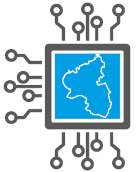AKRIMA
- Duration: 01.01.2022 - 31.12.2024
Funding Organization: BMBF
Prof. Dr. Ingo Timm
Universität TrierMotivation & Goals
The Corona pandemic and recent extreme weather events showed how essential coordinated (corporate) crisis management is. Its cornerstones are flexible, timely and appropriate reactions to changing (crisis) situations. However, the continuous adaptation that is crucial for this represents a considerable challenge for the majority of the actors involved. This is where AKRIMA, the Automatic Adaptive Crisis Monitoring and Management System, comes into play. The AKRIMA project aims to strengthen the crisis resilience of critical infrastructures, logistics chains and authorities and organizations with security tasks through a simulation-based improvement of crisis response mechanisms (KRM). The close cooperation between the various project partners and the target group in practical application is of particular importance. The overall objective of the system is to enable decision-makers to learn from the crisis and previous experiences, in order to improve their ability to act in future crises. For this purpose, extreme crisis scenarios, such as pandemics, heavy rain or drought, are considered using the example of the logistics processes of protective and medical equipment and materials. With AKRIMA, stakeholders can view the information relevant for crisis monitoring and management in a dashboard. The expected consequences of possible courses of action can be examined and evaluated using the AI-based simulation, and the crisis response mechanisms can be optimised to increase resilience. This enables an early response in acute crisis situations and allows to prevent logistics failures as well as supply bottlenecks.
Method & Technical Implementation
First, a fundamental, novel system model is to be designed and implemented, which can represent the real complexity of modern systems as simply as possible and forms the basis for the early detection of the triggers of cascade effects. Based on this, it is necessary to investigate which parameters can be used to describe and evaluate operational processes in general and during a crisis. In addition, the frame in which the identified process archetypes can be influenced in a crisis and are capable of various resilience-enhancing reactions is to be examined. Subsequently, a key figure model is to be designed, which combines these status parameters and indicators for crisis situations into a Logistics Resilience Score. Based on this, existing crisis reaction mechanisms will be evaluated using AI-based pattern recognition and correlation analyses. These mechanisms are also evaluated by means of agent-based simulation of crisis scenarios and systematic exploration of possible developments using data farming. Based on the data farming, an evolution of the crisis response measures will now take place. The first step is to identify patterns which can lead to undesired effects of crisis response measures or prevent their effectiveness and automatically develop alternative proposals for improvement. Subsequently, the updated measures are to be implemented and their effectiveness documented, so that they can be used as input in the next simulation. Finally, the relevant information is to be presented in a powerful dashboard.
https://akrima.dfki.de/en/
